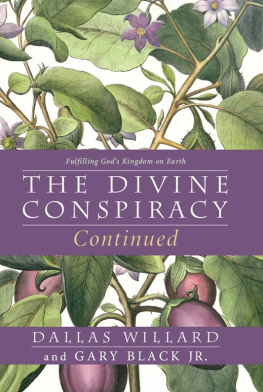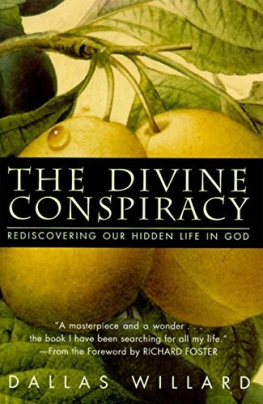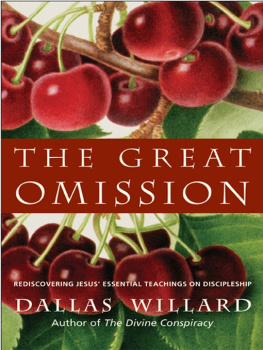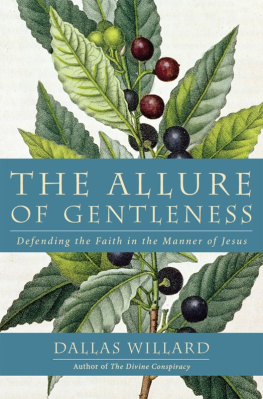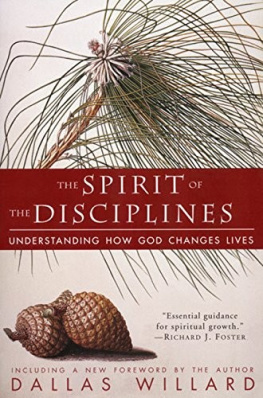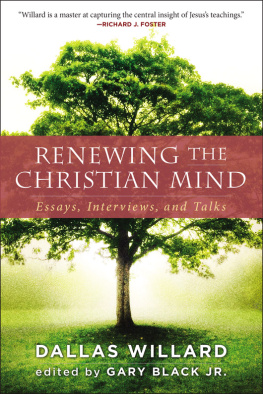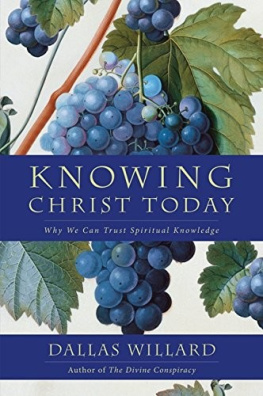Contents
D ALLAS WILLARD SUCCUMBED to the effects of pancreatic cancer prior to the publication of this work. His death has proven to be one of the most significant losses I have experienced, a fact I accept with equal measures of foreboding and gratefulness. I was wholly unprepared for losing Dallas as a mentor, guide, and friend. I was also unaware of how his loss would cause me to discover how deeply our relationship and his teachings affected me.
Although Dallas was candid with me about his illness and I was aware of the difficult challenges of pancreatic cancer, we remained optimistic about his ability to finish this project until only shortly before his death. Therefore, from the beginning of our work together we were both under the impression, and there were reasonable signs of hope, that his condition would improve enough that he would be able to at least finish the manuscript together. Perhaps I didnt allow myself to seriously consider the alternatives. Nevertheless, even up to the final few days of his life, we were progressing toward that goal. However, as events transpired, I found myself needing to do what I hoped would not be necessary, which is to describe some of the overarching vision that motivated Dallas to create this work and how I came to be involved as a coauthor.
I will begin near the end. On May 5, 2013, I received a phone call from Jane Willard, Dallass wife, at about nine thirty in the morning. She told me how Dallass health was deteriorating and asked if I would be able to stay a few days to help him get around the house. He needed assistance moving from place to place safely. She and I had talked a few weeks earlier about the possibility of my staying in the guesthouse and working on the book projects we had in process. I had previously mentioned that I was with my grandmother as she succumbed to pancreatic cancer, and I offered to help in any way I could. Jane asked if there was any wisdom or experience that I could relay about the issues they might face toward the end of Dallass life. I told her all I knew. Like my grandmother, Dallas was experiencing the highs and lows, times of strength and clarity followed by moments of significant weakness. When Jane called that Sunday morning, she was characteristically deferential in her request, making me promise nothing would inconvenience my family. I told her we were all happy to help.
As I packed an overnight bag, my wife gathered our two teenage daughters to pray with me before I left. It was difficult for me to tell my children about Dallass prognosis, and I struggled with my emotions as I discussed what might lie ahead. My elder daughter asked me, Dad, what is it about Dallas that has had such a strong impact on you? As I looked into my daughters eyes, my mind raced back some twenty-five years to my first encounter with Dallas. For a person who often cant recall exactly what he had for breakfast the day before, for some reason I have been able to maintain a vivid memory of that first introduction. Even now, whenever the weight of that distant memory hits my heart, tears are not far behind. For me and countless others, God saw fit to use Dallas and his teachings to spark a foundational shift in our lives, our understanding of the gospel of Jesus Christ, and our awareness of the grand purposes God has for humanity in and through his kingdom. Though unknown to me at the time, my daughters question can serve us well as a means to both explain my participation in this work and start our journey into the objectives and hopes we have for this book.
I was first introduced to Dallass work in 1991. I had been out of college for two years and had two years of marriage under my belt. My wife and I were living in the San Francisco Bay Area, and I was attempting to establish a business career in the real world. As my new bride and I were settling into our cramped little apartment and the challenges of adulthood, we also began to attend a local Covenant Church. There I met a fresh-faced associate pastor named Keith Matthews, who soon invited me to an early morning breakfast. After pleasantries and personal histories were exchanged, he suggested we consider a regular one-on-one breakfast session during which we would discuss a chosen book. Keith was then, as he is now, encouraging, energetic, and intentional about discipleship to Jesus, and I was beginning to miss all the deep, late-night conversations about God and the meaning and purposes of life that I so enjoyed during my university days. So I agreed.
The next week Keith handed me Dallass first book, In Search of Guidance:Developing a Conversational Relationship with God (available today as Hearing God). I remember immediately balking at the title.
Developing a conversational relationship with God? I asked incredulously.
Keith only smiled. He told me Willard was a philosophy professor at the University of Southern California and also a Southern Baptist minister. Keith was toying with me now. He knew of my deep Southern Baptist roots, and we had previously discussed some of my growing discomfort with the eccentricities of modern evangelicalism. Having studied postmodernism briefly in college, I was familiar with some of the emerging ideas in epistemology that conflicted with the traditional modern conceptions of knowledge used to underpin many Christian doctrines. I assumed Keith had to be mistaken.
You dont mean the USC, as in the Trojans USC? I asked.
He assured me I had understood him accurately.
My head was spinning. An ordained Southern Baptist minister who taught philosophy at one of the most prestigious secular universities in the country? I was more than a little intrigued at the iconoclastic possibilities. That little rsum, along with the title of the book, caused a surge of hope and excitement to stir within my heart. Could someone possibly have found a way to break out of the Christian bubble I felt closing in around me? I agreed to read the book.
As it turned out, In Search of Guidance, which was followed by TheSpirit of the Disciplines, began to reveal a spiritual life that was significantly foreign to my previous Christian experience. Little did I know at the time, but those two seminal works allowed me to take the first steps on a journey that I had been yearning to take, even though I was not fully aware of my longing. I am not alone. Increasing numbers of Christians are looking for a reality that is as big as the beliefs we profess. I knew, I just knew, there had to be more to my faith than mental assent to a set of doctrines and practices. I knew that reality was not limited to all that I saw around me. I hoped against hope that there was more to this life and to life in the kingdom of God than hanging on by my fingernails until I died and entered eternity. I knew there had to be a greater purpose for both my life and all of creation than was currently being realized. I was a closet, hopeless, C. S. Lewisesque romantic who deeply longed to find a Narnia. And just when I was about to let go of that lingering sense of what the world could be, to begin rationalizing away my dreams and longings as nothing more than misplaced exuberance and youthful naivet, God used Dallass insights and wisdom to stoke those fading embers of hope in my heart and mind.
Still, this transformation wasnt easy or quick. Keith was a willing and able guide, and together we waded purposefully and sometimes painfully through the pages of Willards workoften staying stuck on one idea for weeks on end. Keith was patient and committed, despite my stubborn resistance to the revolutionary ideas I was encountering. What was most compelling to me, then as now, was the level of courageous critique I discovered in Willards writing combined with an encouragement to seek a deep level of personal authenticity. This blend of critical analysis and a vision for change was missing in most other Christian authors of the time and more accurately reflected the style, rigor, and insight of Dietrich Bonhoeffers works. Still, my traditional evangelical roots kept me mildly skeptical of Willards description and use of the spiritual disciplines. It all sounded a little too Catholic or works-centered for my Protestant grace-first tradition.

